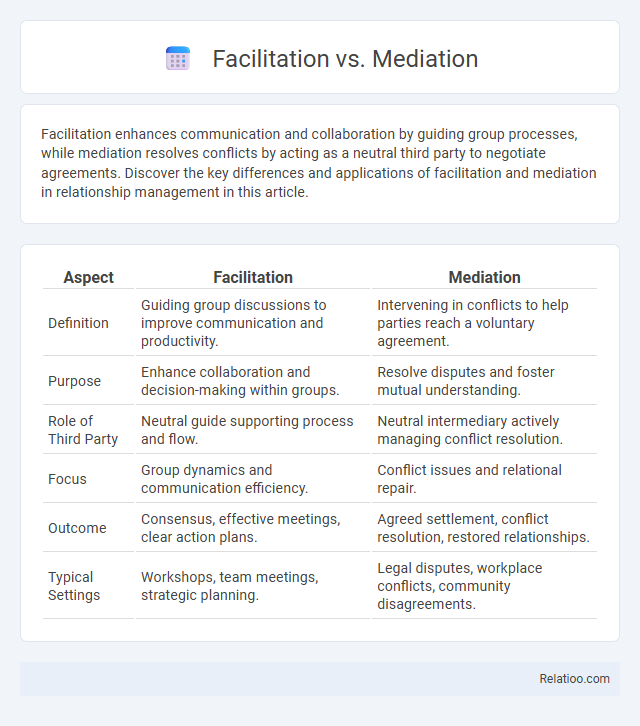Facilitation enhances communication and collaboration by guiding group processes, while mediation resolves conflicts by acting as a neutral third party to negotiate agreements. Discover the key differences and applications of facilitation and mediation in relationship management in this article.
Table of Comparison
| Aspect | Facilitation | Mediation |
|---|---|---|
| Definition | Guiding group discussions to improve communication and productivity. | Intervening in conflicts to help parties reach a voluntary agreement. |
| Purpose | Enhance collaboration and decision-making within groups. | Resolve disputes and foster mutual understanding. |
| Role of Third Party | Neutral guide supporting process and flow. | Neutral intermediary actively managing conflict resolution. |
| Focus | Group dynamics and communication efficiency. | Conflict issues and relational repair. |
| Outcome | Consensus, effective meetings, clear action plans. | Agreed settlement, conflict resolution, restored relationships. |
| Typical Settings | Workshops, team meetings, strategic planning. | Legal disputes, workplace conflicts, community disagreements. |
Understanding Facilitation: Key Concepts
Facilitation involves guiding a group through processes to achieve collective goals by encouraging participation, clarifying objectives, and managing interactions. Mediation focuses on resolving conflicts between parties by acting as a neutral intermediary to foster agreement and mutual understanding. Your effective facilitation hinges on mastering techniques like active listening, impartiality, and creating an inclusive environment that supports open communication.
What is Mediation? Core Principles
Mediation is a structured process where an impartial third party helps disputing individuals or groups communicate and negotiate to reach a mutually acceptable agreement. Core principles of mediation include confidentiality, neutrality, voluntary participation, and self-determination, ensuring that your interests and solutions are at the forefront. This method differs from facilitation, which primarily guides group discussions, by focusing explicitly on resolving conflicts through consensus.
Main Differences Between Facilitation and Mediation
Facilitation and mediation are distinct conflict resolution processes primarily differing in their roles and objectives. Facilitation involves guiding a group to improve communication and decision-making without directly addressing conflicts, whereas mediation focuses on resolving disputes by actively assisting conflicting parties to reach a mutually acceptable agreement. Mediators maintain neutrality but intervene more directly to manage conflict dynamics, while facilitators concentrate on process management and fostering collaboration without imposing solutions.
Roles and Responsibilities of Facilitators
Facilitators guide group processes by ensuring productive communication and collaboration without imposing decisions, focusing on maintaining neutrality and managing group dynamics. Mediators take a more directive role, actively helping disputing parties find common ground and resolve conflicts through negotiation and problem-solving. Understanding your role as a facilitator involves promoting open dialogue and inclusivity while avoiding decision-making authority, unlike mediators who engage directly in conflict resolution.
Roles and Responsibilities of Mediators
Mediators act as neutral third parties who guide disputing parties towards a mutually acceptable resolution by fostering open communication and understanding without imposing decisions. Their responsibilities include managing the mediation process, ensuring confidentiality, clarifying issues, and encouraging collaborative problem-solving. Unlike facilitators who focus on group dynamics and process management, or arbitrators who make binding decisions, mediators empower participants to reach voluntary agreements.
Appropriate Use Cases for Facilitation
Facilitation is most appropriate in group settings aimed at collaborative decision-making, brainstorming, or problem-solving where a neutral guide helps manage discussions and ensure equal participation. Unlike mediation, which is used specifically to resolve conflicts between parties, facilitation supports process efficiency and clarity in meetings or workshops without directing outcomes. Effective facilitation is ideal for team alignment, strategic planning sessions, and workshops requiring balanced input and structured dialogue.
When to Choose Mediation: Clear Scenarios
You should choose mediation when conflicts involve deeply personal issues, such as family disputes or emotional grievances, where a neutral third party can help facilitate communication and understanding. Mediation is ideal when both parties seek a confidential, cooperative process to find mutually acceptable solutions without resorting to litigation. Scenarios like workplace harassment claims, neighborhood disagreements, or divorce settlements often require mediation to address sensitive matters effectively and preserve relationships.
Skills Required: Facilitators vs. Mediators
Facilitators require strong communication, active listening, and neutral problem-solving skills to guide group discussions and ensure equal participation without influencing outcomes. Mediators need advanced conflict resolution abilities, empathy, and negotiation expertise to help disputing parties reach a mutually acceptable agreement. Your choice between facilitation and mediation depends on whether the goal is to manage group dynamics or resolve specific conflicts.
Advantages and Limitations of Each Approach
Facilitation enhances group communication by promoting open dialogue and ensuring all voices are heard, but it may struggle with resolving deep-seated conflicts due to its neutral stance. Mediation offers a structured process to resolve disputes by guiding conflicting parties toward mutually acceptable solutions, though it relies heavily on participant willingness and impartiality. Your choice between these approaches should consider the specific context: facilitation excels in collaborative decision-making, mediation is ideal for conflict resolution, and facilitation combines elements of both but may require skilled practitioners to manage complex dynamics effectively.
How to Select the Right Conflict Resolution Method
Selecting the right conflict resolution method depends on the nature of the dispute and the desired outcome. Facilitation is ideal when guiding group discussions to encourage collaboration, while mediation suits situations requiring a neutral third party to assist in mutual agreement between conflicting parties. You should choose arbitration or facilitation based on the level of control you need over the decision-making process and the need for binding resolutions.

Infographic: Facilitation vs Mediation
 relatioo.com
relatioo.com